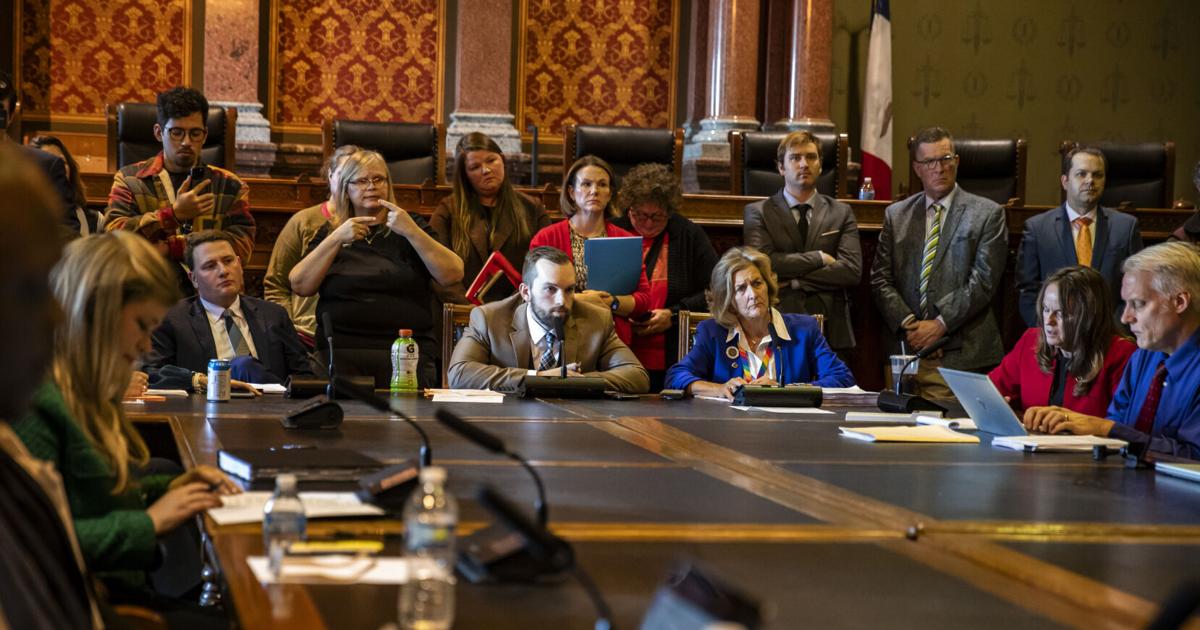Suzanne Castello became emotional and at times raised her voice as she spoke Wednesday to Iowa lawmakers about the aid and services her son has received from the area education agency in her region.
Her son, Gabe, has dyslexia and dysgraphia, which impact his ability to read and write. He had difficulties in preschool with sitting still and needed an occupational therapist. For four years, Castello home-schooled him. Now he attends Grinnell High School.
And through it all, Castello said, the local AEA has aided Gabe with specialized professionals and services.
“There are deep problems in our school districts in delivery of education,” she told lawmakers. "I do not see the AEA as a problem. And I'm really mad that I am in an institution that is depriving school districts of money, and keeps on skimping and skimping and skimping. And then, when there's not enough money to actually get good education, then they say, 'Oh, you're failing, so we're just going to cut the overhead.'"
Castello was one of dozens of people at the Iowa Capitol to speak Wednesday against a bill proposed by Republican Gov. Kim Reynolds that would overhaul the state’s area education agencies and give schools the ability to opt out of their special education services and seek them from another party.
The proposal,
House Study Bill 542, also met resistance from majority Republican lawmakers in both the House and the Senate as it faced its first hurdle to becoming law.
Republican Rep. Skyler Wheeler of Hull, chair of the House Education Committee, declined to advance the bill out of a subcommittee, saying he wanted “further conversations before we take action on the bill.” Over in the Senate, Republicans advanced the bill but pledged it would see more changes as it moves forward.
Republican Rep. David Young of Van Meter, an assistant Republican leader in the House, expressed skepticism about the bill’s future in the chamber. He said there is “not a lot of appetite” for the reforms called for in the proposal, but said Republicans support the teacher pay increases also included in the bill.
Reynolds pitched the bill as a key piece of her agenda for this year’s session. She said the change is necessary as test scores of Iowa students with disabilities have lagged but the state sends a comparatively high amount of money on those students.
"We need to just step back and start to ask some of those questions with the overall objective of making sure that we're doing everything we can to get these kids with disabilities the education that they deserve and hopefully see better outcomes," Reynolds told reporters Wednesday. "So you can't police yourself, get all the money, mandate I use you, and not be held accountable when the scores are not reflecting what they should be. That's unconscionable."
Iowa's nine AEAs, which are governmental agencies separate from the state Department of Education, provide special education services to school districts in their boundaries and assist with classroom equipment and media services, professional development and talented and gifted instruction, among other services.
Under the proposal, which Reynolds amended this week, federal and state special education funds would be sent directly to school districts, which could then decide whether to contract with the AEAs. If they do not, school districts would still have the legal obligation to educate students with disabilities, but could obtain that instruction from a third party, like a private company.
Currently, AEAs receive special education funding for the schools in their region and are tasked with providing that education to those districts.
AEAs would also still be allowed to provide other services to school districts under Reynolds’ amended proposal — if the district requests them and they are approved by the Education Department.
The bill would keep in place a $35 million property tax levy that schools can use to pay for the AEAs’ educational services, but remove a $33 million property tax stream that funds the agencies’ media services. The education service funds could be used for media services.
Under the proposal, much of the AEAs' operations and oversight would also come under the purview of the state Department of Education. The department director would be in charge of hiring AEA directors, making decisions on combining and dissolving AEAs and approving budgets submitted by the AEAs.
The bill would also create a special education division in the Department of Education and bring the employees in charge of oversight under the Department of Education. That change would lead to more than 200 AEA staff positions being cut, Reynolds said.
The bill also includes a provision to increase the starting salary for teachers to $50,000. Teachers with at least 12 years of experience would be paid at least $62,000.
School administrators split
Superintendents spoke both for and against the bill during subcommittee meetings.
Some superintendents who backed the bill said they want to maintain control of the special education dollars for their students, and they said they can provide those same services for a lower cost.
Corey Seymour, superintendent of the Clear Creek Amana Community School District, said the Grant Wood AEA — based in Cedar Rapids — has provided vital services, but he believes districts should be in charge of funding for their students with disabilities.
“Each district is different, and with control of our flow-through funds, we will be able to create an individual education plan for our entire district,” he said. “If services are adequate and addresses the needs of our district, we will continue to use them.”
But others said smaller districts would not be able to provide the same level of services. Without absorbing the funding from all the schools in the district, they said, AEAs would not be able to pay for services needed by schools with less money.
Brad Buck, the Waukee Community School District superintendent and former Iowa Department of Education director under Republican Gov. Terry Branstad, said the bill would hurt rural school districts and create “winners and losers.”
“There's no way this math works like it's being described,” he told Senate lawmakers. “I'm just telling you that. It's far more likely that larger districts will come out in better shape and this bill will impact smaller, and especially rural districts.”
What’s next for the bill?
After passing the Senate subcommittee, the bill is eligible for a vote in the full committee. The Republicans on that committee, though, cautioned that the bill would likely see a number of changes.
Sen. Ken Rozenboom, R-Pella, chair of the Senate Education Committee, said he believes the AEAs need a “tune up, or probably a more major overhaul.”
It is unclear whether the bill will advance in the House. After Feb. 16, any bill that has not been reported out of a committee is generally not eligible for further consideration.
“But I believe it’s also widely acknowledged that we don’t have all the answers in front of us today,” Rozenboom said. “I believe we need to continue the legislative process to find these answers. … I’ll roll up my sleeves and continue to find solutions that serve our children well.”
Democrats opposed the bill in both subcommittees. They said the bill would consolidate too much power under the Department of Education and worried that the bill was written without input from stakeholders in the state.
"There is no flexibility in this bill," said Sen. Molly Donahue, a Democrat from Cedar Rapids. "It takes local control away from our schools and our districts 133 times. … If you're unhappy with the administrative costs, then deal with the administrative costs. Don't throw the whole baby out with the bathwater."
Parents of students with disabilities said they were worried the bill would weaken Iowa's special education services

nonpareilonline.com










